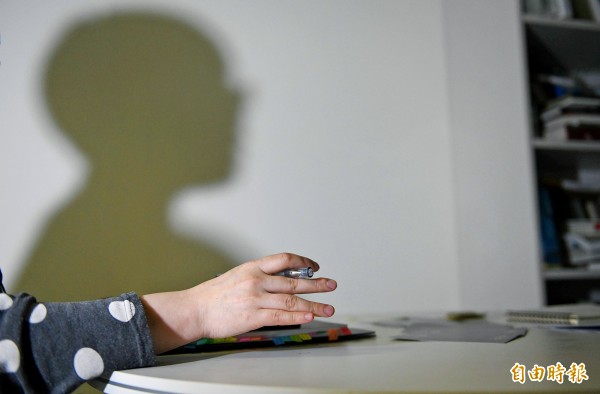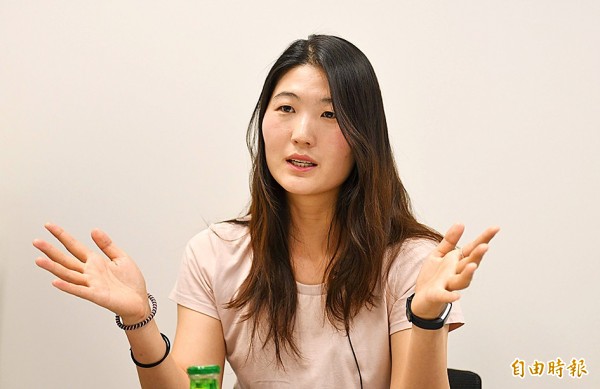《TAIPEI TIMES》 Rapes and beatings: the torments of South Korea’s young athletes

The shadow of a South Korean woman who asked to be identified only as “D” for fear of her personal safety is in May pictured during an interview in Seoul. Photo: AFP
The country’s male-dominated sports establishment facilitates abuse, making it hard to root out
/ AFP, SEOUL
When Kim Eun-hee was 10 years old, a primary school child with dreams of tennis stardom, her coach raped her for the first time. Then he did it again. And again. And again.
The would-be South Korean champion was too young to even know what sex was. But she knew she dreaded the repeated orders to come to his room at their training camp, the pain and the humiliation.
“It took me years to realize that it was rape,” Kim said, adding: “He kept raping me for two years... he told me it was a secret to be kept between him and me.”
Now 27, Kim spoke to international media for the first time and waived all rights to anonymity to reveal how female athletes in the South have silently suffered sexual abuse by their coaches.
South Korea is perhaps best known for its technological prowess and K-pop stars, but is also a regional sporting power and besides Japan is the only Asian country to have hosted both summer and winter Olympics.
Despite its relatively small size and population, South Korea is regularly in the top 10 medal table places at both Games, and is globally dominant in archery, taekwondo and short-track speed skating, while packing the top positions in world women’s golf rankings.
But it remains hierarchical and patriarchal in many respects, including a close-knit, male-dominated sports establishment — where personal connections can be almost as important as performances in forging a successful career.
In a highly competitive society where winning is everything, many young athletes forego schooling or live away from families to train with their peers and coaches full-time, living in a dorm-like environment for years.
The training camp system — akin to models used by Communist sporting machines such as China — is credited with helping the South punch well above its weight on the global sporting stage.
But it has proven to be the setting for abuse in several sports — especially of underage athletes whose existence is controlled by their trainers.
“The coach was the king of my world, dictating everything about my daily life from how to exercise to when to sleep and what to eat,” said Kim, adding that he beat her repeatedly as part of “training.”
The coach was eventually dismissed after some parents complained of his “suspicious behavior,” but was simply moved to another school with no criminal inquiry.
BLIND EYE
Many victims are forced into silence in a world where going public often means the end of any aspirations to stardom.
“This is a community where those who speak out are ostracized and bullied as ‘traitors’ who brought shame to the sport,” said Chung Yong-chul, sports psychology professor at Seoul’s Sogang University.
A 2014 survey commissioned by the Korean Sports & Olympic Committee showed that around one in seven female athletes had experienced sexual abuse in the previous year, but 70 percent of them did not seek help of any kind.
“Parents of many underage victims give up pressing charges after a sport official, usually a friend of the abuser, tells them, ‘Do you wanna see your child’s future as an athlete destroyed?’” said Chung Hee-joon, a prominent commentator on sporting issues.
At the same time, sporting organizations often try to hush up misbehavior, merely transferring the offender to a new institution, he added, blaming the country’s elitist sports culture.
“Sports associations turn a blind eye as long as the sex abusers manage to produce high-performing athletes in this blind pursuit of medals above all — and their abuses are considered a small, insignificant price to pay in this process,” Chung said.
In 2015, a former short-track Olympic champion was only fined for repeatedly groping female skaters he was coaching at the Hwaseong City team and sexually harassing an 11-year-old.
Even top athletes have been affected.
Choi Min-suk, the coach of the women’s curling team for the 2014 Winter Olympics in Sochi, resigned after the players accused him of sexual harassment — but he was later hired to coach another curling team.
Abuse can sometimes be physical, rather than sexual.
Earlier this year, Shim Suk-hee, a star short-track skater who has won four Olympic medals — including a relay gold at this year’s Pyeongchang Games — accused her coach of punching and kicking her dozens of times, leaving her needing medical treatment for a month.
Cho Jae-beom admitted to police that he beat Shim and other national team skaters at their training camp to “improve their performance.”
‘MY RAPIST CONTINUED TO COACH’
Kim won a women’s doubles bronze at the South’s national sports festival but was always nauseated by players panting heavily on court, a sound that reminded her of her abuser.
Even so, she continued to play tennis and ran into the man at a tournament two years ago, bringing back the trauma and nightmares of her youth, when she regularly dreamed he was trying to kill her.
“I was horrified to see that my rapist continued to coach young tennis players for more than a decade as if nothing had happened,” she said.
“I thought to myself, ‘I’m not going to give him any chance to abuse little girls any more.’”
She filed a criminal complaint against him, and he was subsequently charged.
Four of her friends testified about abuses they had suffered at his hands and Kim took the stand herself, although she could not bear to face him and exercised her right to have him removed from the room.
In the same vein, she stood just outside the court in October to hear him convicted of rape with injury and sentenced to 10 years in prison.
“I kept crying and crying, overcome with all these emotions from sadness to happiness,” she said.
Now retired from competition, Kim teaches tennis to young children at a city gym.
“Seeing them laughing and enjoying playing tennis heals me,” she said. “I want them to become happy athletes, unlike me,” she added. “What’s the point of winning Olympic medals and becoming a sports star if you have to be constantly beaten and abused to get there?”
新聞來源:TAIPEI TIMES

Former South Korean tennis player Kim Eun-hee in May speaks during an interview in Seoul. Photo: AFP











